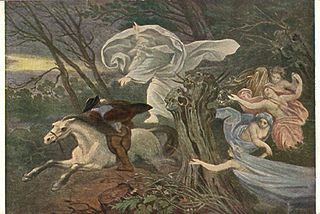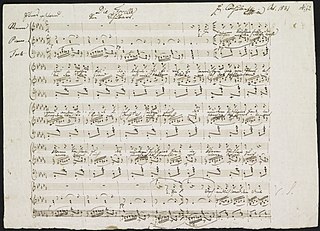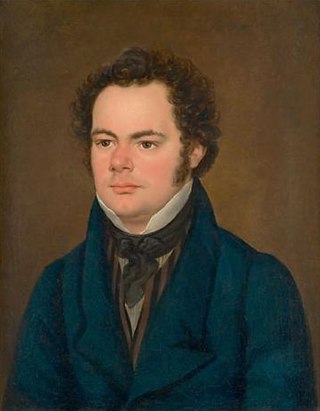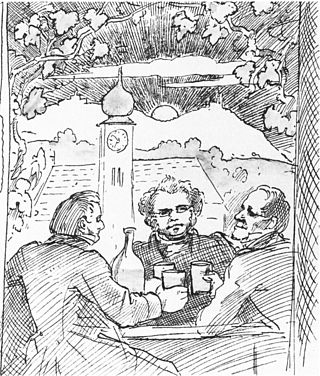Die Sterne is a German pop band. "Die Sterne" translates as "the stars" and may also refer to:

Franz Peter Schubert was an Austrian composer of the late Classical and early Romantic eras. Despite his short life, Schubert left behind a vast oeuvre, including more than 600 secular vocal works, seven complete symphonies, sacred music, operas, incidental music, and a large body of piano and chamber music. His major works include the art songs "Erlkönig", "Gretchen am Spinnrade", "Ave Maria"; the Trout Quintet, the unfinished Symphony No. 8 in B minor, the "Great" Symphony No. 9 in C major, the String Quartet No. 14 Death and the Maiden, a String Quintet, the two sets of Impromptus for solo piano, the three last piano sonatas, the Fantasia in F minor for piano four hands, the opera Fierrabras, the incidental music to the play Rosamunde, and the song cycles Die schöne Müllerin, Winterreise and Schwanengesang.

Winterreise is a song cycle for voice and piano by Franz Schubert, a setting of 24 poems by German poet Wilhelm Müller. It is the second of Schubert's two song cycles on Müller's poems, the earlier being Die schöne Müllerin.

"Erlkönig" is a poem by Johann Wolfgang von Goethe. It depicts the death of a child assailed by a supernatural being, the Erlking, a king of the fairies. It was originally written by Goethe as part of a 1782 Singspiel, Die Fischerin.

"Die Forelle", Op. 32, D 550. is a lied, or song, composed in early 1817 for solo voice and piano with music by the Austrian composer Franz Schubert (1797–1828). Schubert chose to set the text of a poem by Christian Friedrich Daniel Schubart, first published in the Schwäbischer Musenalmanach in 1783. The full poem tells the story of a trout being caught by a fisherman, but in its final stanza reveals its purpose as a moral piece warning young women to guard against young men. When Schubert set the poem to music, he removed the last verse, which contained the moral, changing the song's focus and enabling it to be sung by male or female singers. Schubert produced six subsequent copies of the work, all with minor variations.

A drinking song is a song sung while drinking alcohol. Most drinking songs are folk songs or commercium songs, and may be varied from person to person and region to region, in both the lyrics and in the music.

Im Frühling in G major is a Lied by Austrian composer Franz Schubert.

Der Zwerg is a lied for voice and piano by Franz Schubert, written in the mid-1820s on a text by Matthäus von Collin. The poem is in terza rima. In Otto Erich Deutsch's catalogue of Schubert's works, it is Op. 22, No. 1, D. 771.

Johann Baptist Mayrhofer was an Austrian poet and librettist. He is best known for his close friendship with the composer Franz Schubert.
Forelle may refer to:

"Auf dem Wasser zu singen", D. 774, is a Lied composed by Franz Schubert in 1823, based on the poem of the same name by Friedrich Leopold zu Stolberg-Stolberg.
Amalia may refer to:
Franz Schubert's best-known music for the theatre is his incidental music for Rosamunde. Less successful were his many opera and Singspiel projects. On the other hand, some of his most popular Lieder, like "Gretchen am Spinnrade," were based on texts written for the theatre.

Franz Schubert's best known song cycles, like Die schöne Müllerin and Winterreise are based on separate poems with a common theme and narrative. Other song cycles are based on consecutive excerpts of the same literary work: Schubert's "Ave Maria" is part of such a song cycle based on excerpts of the same poem, in this case by Walter Scott.
Mignon, a character appearing in Johann Wolfgang von Goethe's writings such as Wilhelm Meister's Apprenticeship and Wilhelm Meister's Journeyman Years, is the subject of several Lieder by Franz Schubert.
"An Sylvia", D 891; Op. 106, No. 4, is a Lied for voice and piano composed by Franz Schubert in 1826 and published in 1828. Its text is a German translation by Eduard von Bauernfeld of "Who is Silvia?" from act 4, scene 2, of The Two Gentlemen of Verona by William Shakespeare. "An Sylvia" was composed during a peak in Schubert's career around the time he was writing the Ninth Symphony "Great", two years before his death.

Die Freunde von Salamanka D. 326, is an 1815 Singspiel in two acts by Franz Schubert to a libretto by Johann Mayrhofer.
Franz Schubert composed a number of works known as Ständchen, meaning serenade.